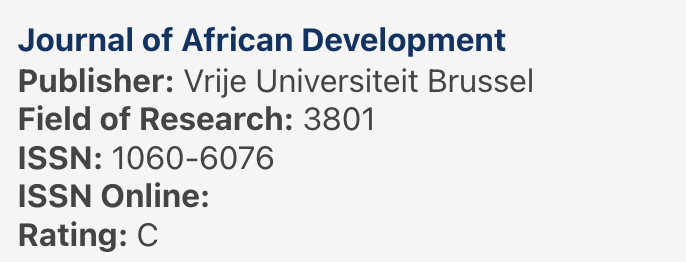submission.afea.jad@gmail.com
|
FAQs
Journal of African Development
ISSN (Print): 1060-6076

About the Journal
The Journal of African Development (JAD) is a peer-reviewed, open-access academic journal established to provide a platform for innovative and impactful research addressing critical development challenges and opportunities across the African continent. As of 2025, the journal is proudly published by the ournal of African Development Editorial Team, a reputed …
Read more about the journal



View All Indexings
August 24, 2025
Research Article
Open Access
Masculinities and Gender Norms in African Society
Journal of African Development Volume:4, Issue:1, Pages 12 - 16
Received
June 19, 2025
Revised
June 24, 2025
Accepted
July 4, 2025
Published
Aug. 24, 2025
Abstract
July 30, 2025
Research Article
Open Access
Digital Democracy: The Role of Social Media in African Elections
Journal of African Development Volume:6, Issue:1, Pages 1 - 6
Received
March 22, 2025
Revised
March 24, 2025
Accepted
April 1, 2025
Published
July 30, 2025
Abstract
July 30, 2025
Research Article
Open Access
Gender Mainstreaming in African Political Institutions
Journal of African Development Volume:6, Issue:1, Pages None - None
Received
July 26, 2025
Revised
June 28, 2025
Accepted
July 2, 2025
Published
July 30, 2025
Abstract
July 27, 2025
Research Article
Open Access
Health System Strengthening in Post-Conflict African States
Journal of African Development Volume:6, Issue:1, Pages 60 - 62
Received
June 7, 2025
Revised
June 8, 2025
Accepted
June 26, 2025
Published
July 27, 2025
Abstract
July 27, 2025
Research Article
Open Access
African Judicial Reforms and Rule of Law
Journal of African Development Volume:6, Issue:1, Pages 45 - 47
Received
April 16, 2025
Revised
April 18, 2025
Accepted
May 2, 2025
Published
July 27, 2025
Abstract
July 26, 2025
Research Article
Open Access
The Rise of Populism and Its Impact on African Governance
Journal of African Development Volume:6, Issue:1, Pages 57 - 59
Received
March 20, 2025
Revised
March 20, 2025
Accepted
April 2, 2025
Published
July 26, 2025
Abstract
July 26, 2025
Research Article
Open Access
The Role of Parliaments in African Development Planning
Journal of African Development Volume:6, Issue:1, Pages 51 - 53
Received
June 18, 2025
Revised
June 18, 2025
Accepted
June 28, 2025
Published
July 26, 2025
Abstract
July 26, 2025
Research Article
Open Access
COVID-19 Pandemic and Its Long-Term Impact on African Health Systems
Journal of African Development Volume:6, Issue:1, Pages 63 - 65
Received
June 19, 2025
Revised
June 20, 2025
Accepted
June 23, 2025
Published
July 26, 2025
Abstract
July 30, 2025
Research Article
Open Access
Digital Democracy: The Role of Social Media in African Elections
Journal of African Development Volume:6, Issue:1, Pages 1 - 6
Received
March 22, 2025
Revised
March 24, 2025
Accepted
April 1, 2025
Published
July 30, 2025
Abstract
September 2, 2023
Research Article
Open Access
Indigenous Knowledge and Curriculum Integration
Journal of African Development Volume:4, Issue:1, Pages 28 - 31
Received
May 12, 2023
Revised
May 14, 2023
Accepted
May 22, 2023
Published
Sept. 2, 2023
Abstract
August 24, 2025
Research Article
Open Access
Masculinities and Gender Norms in African Society
Journal of African Development Volume:4, Issue:1, Pages 12 - 16
Received
June 19, 2025
Revised
June 24, 2025
Accepted
July 4, 2025
Published
Aug. 24, 2025
Abstract
September 19, 2021
Research Article
Open Access
African Diaspora Investments and Entrepreneurship
Journal of African Development Volume:2, Issue:1, Pages 50 - 54
Received
Feb. 12, 2021
Revised
June 28, 2021
Accepted
Aug. 8, 2021
Published
Sept. 19, 2021
Abstract
Original Article
Open Access
Beyond Numbers: Evaluating the Role of Non-Financial Environmental, Social and Governance (ESG) Indicators in Corporate Sustainability Disclosures
Journal of African Development Volume:6, Issue:1, Pages 119 - 131
Abstract
July 20, 2025
Research Article
Open Access
Decentralization and Local Governance: Lessons from Kenya and Uganda
Journal of African Development Volume:6, Issue:1, Pages 33 - 35
Received
May 22, 2025
Revised
May 23, 2025
Accepted
June 26, 2025
Published
July 20, 2025
Abstract
October 19, 2021
Research Article
Open Access
E-Health Systems in African Public Hospitals
Journal of African Development Volume:2, Issue:1, Pages 6 - 8
Received
Feb. 12, 2021
Revised
March 28, 2021
Accepted
Aug. 8, 2021
Published
Oct. 19, 2021
Abstract
June 2, 2022
Research Article
Open Access
Climate-Induced Migration in the Sahel Region
Journal of African Development Volume:3, Issue:1, Pages 4 - 6
Received
May 15, 2022
Revised
May 17, 2022
Accepted
May 21, 2022
Published
June 2, 2022
Abstract
News
No News
Announcements
27th Jul, 2025
Launch of the Online Version of the Journal of African Development (JAD)
Journal of African Development
Open Access
© Copyright Journal of African Development